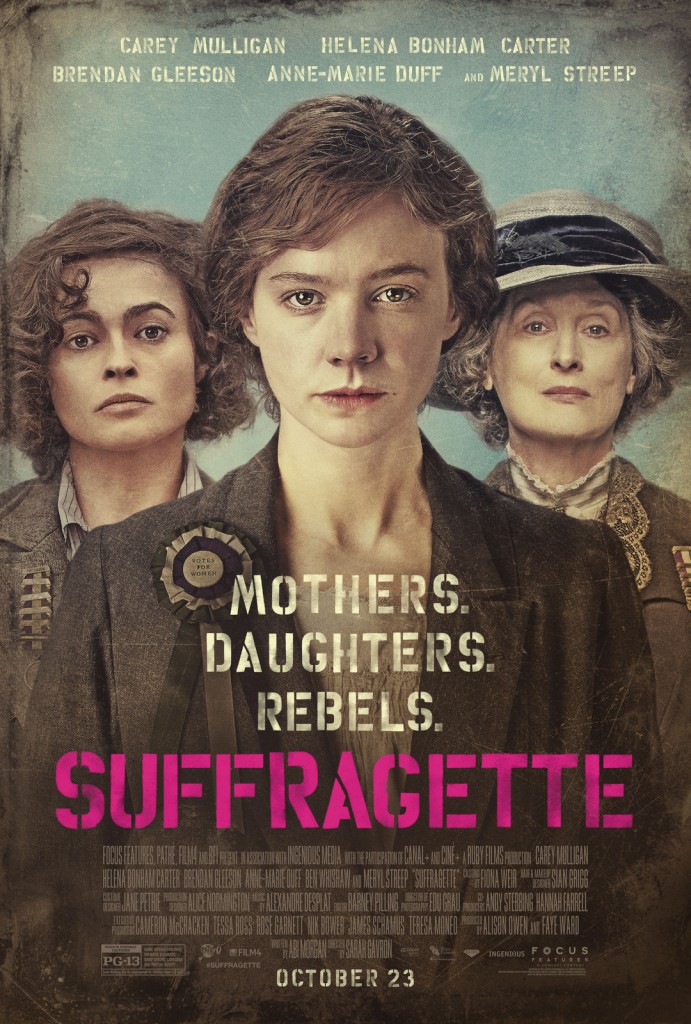by Bonnie Anderson and Dan Webster
This British film chronicles in depressing detail how women were systemically denied the vote as well as other rights reserved for men only in England. Barely more than a hundred years ago women were being jailed and beaten in their struggle for equal rights under the law.
The most striking thing about this film is the stark reality of the early feminist movement. It was dangerous business to go against the will of the male dominated power structure and working women in particular who dared to do so paid high personal prices.
‘Suffragette’ is one of those “inspired by true events” movies so some of the characters existed in the early 20th century but most are mashups of historical figures. In something a tad bigger than a cameo role, Meryl Streep plays Emmeline Pankhurst who founded the Women’s Social and Political Union in Britain. Its motto came to be, “deeds not words” and when her character asks Maude Watts (Carey Mulligan), laundress turned activist and the central figure in the film, if she’s willing to commit herself to the struggle such as throwing rocks through windows, she tells her new recruit, “I don’t want to be a law breaker. I want to be a lawmaker.”
One article at biography.com suggests the real identities of the fictional characters in ‘Suffragette’ and gives a deeper understanding of what these women endured. The article suggests the Maude Watts’ character was inspired by Hannah Webster Mitchell who grew up poor and originally thought the cause was only for middle-class and upper-class women since the vote was reserved for property owners.
Well-to-do women were also suffragettes and it is usually women of this social and economic class that were quoted in the press and received publicity. The “sub text” of this film lies in the class differences between the women, and movie- goers will need to watch carefully for examples of it. The “foot soldiers” of the movement are the working class women and they are the focus of this film. After hard toil and a 10 hour day in the laundry, working women would primarily be the ones to implement the plans to take the campaign to a higher level so that they could be ignored no longer. Firebombing mailboxes, smashing windows and other militant activities took nerve and deep desire for change. They managed this in addition to their role as wives, cooks, housekeepers and mothers.
It is not a movie spoiler to say that the women eventually got the vote. We all know that, and we also know that today among women in the USA there are still huge class gaps in the areas of education, lifestyle, wages, job opportunities and more. There are also significant disparities in wages between women and men in this country.
Fast forward just a few decades and women still struggle for equality under the law in many countries. The scenes we see in ‘Suffragette’ could easily be alive today in any country where some people are deprived of the rights held by others. Whenever people challenge the status quo it often produces similar results with protesters; police brutality, further marginalization, and pleas for patience.
The most regrettable reality is that many women of the world still suffer unspeakable situations. In our mind’s eye and through the lens of faith we see, with truthful clarity, the needs of others. Remembering is a start, but not enough.
“Power concedes nothing without demand. It never did and it never will.” Frederick Douglass
Bonnie Anderson is a very active lay leader in her parish, diocese and in the wider Episcopal Church. She is an experienced community organizer and lives in suburban Detroit. Dan Webster is an Episcopal priest in Baltimore, Maryland and a former broadcast news executive. But don’t expect only east coast urban perspectives here. As it turns out, they both grew up in Southern California. They blog about films and faith at Faith Reels

